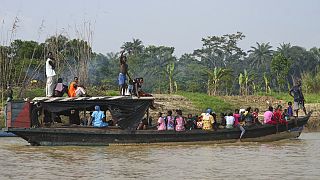Africa
Africa’s freshwater fish are disappearing at alarming rates, with a new report from the World Wide Fund for Nature warning that over a quarter of species face extinction.
On Lake Victoria, the continent’s largest lake, fish catches have dropped sharply — a crisis that is already being felt by local traders.
Elizabeth Didi, fish trader: "Back in the days we would get like 200 kilograms per day and nowadays just getting 20 kilograms is a big challenge and now it seems like the numbers are going down. This is what I know from my life and if the number of fish goes down, I don't know what else I will go into."
The WWF report, Africa’s Forgotten Fishes, finds that invasive species, pollution, and overfishing are driving the decline. In Lake Victoria alone, more than 200 cichlid species have already been lost, while illegal nets continue to land undersized fish, making recovery harder.
Eric Oyare, Environmental Economist, WWF: "We are faced by invasions by non native species including water hyacinth and other aquatic species including for instance the Nile perch in Lake Victoria, salvinia molesta in southern parts of Africa including for instance in Lukanga swamps in Zambia. We are also faced with pollution within our freshwater ecosystems especially within the wetlands and this is driven by industrial waste, pesticides and other chemicals which come out of agricultural use but also causes like mining which pollute these ecosystems."
The report warns the problem stretches far beyond Lake Victoria. In the Zambezi floodplain, fish catches are down by 90 percent, while in Lake Malawi, populations of chambo tilapia have plunged by 94 percent.
Freshwater fish are vital for food security, income, and ecosystem health, but researchers say conservation efforts have long been underfunded compared to marine fisheries. WWF is now urging African governments to adopt an Emergency Recovery Plan, focused on cleaning up waterways, curbing invasive species, and ending unsustainable fishing practices.
The next decade, scientists say, will determine whether Africa’s inland waters can be restored — or whether more species will be lost forever.













Go to video
US federal government enters shutdown, raising fears of global uncertainty
02:05
After 25 years, US-Africa trade lifeline AGOA comes to an end
01:12
White House says Trump supports renewal of African trade initiative due to expire
00:09
UN delegates use fashion to bring culture and tradition to global stage
02:31
Africa takes pride in hosting its first road cycling world championship
02:06
African leaders demand equity and UN reform, decrying marginalization